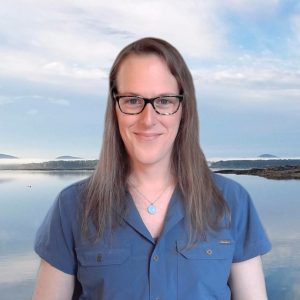Bea Van Dam – 2022 Award for Student Mentorship

Doctoral Student, School of Earth and Climate Sciences, UMaine
Outstanding mentorship of students in sustainability research
I am honored to have been nominated and selected for the 2022 Senator George J. Mitchell Center for Sustainability Solutions award for outstanding mentorship of students in sustainability research. Since beginning as an undergraduate here at UMaine I have benefited tremendously from being able to work under mentors who helped me explore and hone my interests in geographic information systems (GIS), spatial data, and water resources. As a graduate student I have tried to be a similar presence for undergraduate students in classroom, research learning, tutoring, and internship settings.
I’ve been fortunate over the last year to have the opportunity to work with an amazing group of UMaine undergraduate researchers – Cade King, Hayden Libby, Morgan Oehler, Angie Casella, and Sam Roberts of the Watershed Process and Estuary Sustainability (WPES) Research Group – on research led by Dr. Sean Smith (Earth and Climate Sciences, UMaine) and Dr. Neil Thompson (Natural Sciences, UMFK) into developing a stream diagnostic tool set for detecting changes in stream conditions in deglaciated upland watersheds. The goal of developing this tool set was to help guide sustainable watershed management decision-making by assessing the effects of different forest harvesting activities and civil infrastructure on stream conditions and associated cold water fisheries habitat under a changing climate. A major aspect of the project was an intensive field season in which the student researchers gathered detailed survey measurements at a series of stream reference sites with different harvesting histories across a forested watershed in Maine’s North Woods.
This was the first time I was heavily involved in a project where I would not be present for the field work for which I was helping train students, with the added twist that the study site would be out of cellular range if challenges arose during data gathering. The solution was the development of instructional manuals with step by step guidance for using and troubleshooting the survey instruments, which also became the teaching materials for training the students before the field season began. This ended up being an iterative process, where every time an unexpected error came up in training, we would collectively address it and add it to the manual. After the field season we went through a similar process together with the development of written workflows for analyzing the field data using GIS software. In the end, having to think of alternate approaches for supporting the students resulted in a series of manuals that will preserve institutional knowledge and provide guidance to WPES researchers long after I graduate, and the student involvement in manual creation helped them develop deeper understanding and expertise in the equipment and software they were using. This expertise allowed the students to perform more in-depth and advanced analyses of stream conditions, creating a more complete decision support tool set for stakeholders. Beyond the North Woods project, WPES students have also begun their own mentoring journeys by helping first-year undergrads conduct stream surveys through a research learning experience course.
Students, researchers, and potential stakeholders interested in getting involved in projects with the WPES Research Group can visit our website to explore our current research, publications (including the instruction manuals), and ongoing networking initiative. As an interdisciplinary research team we address surface water-related sustainability issues from Maine’s interior headwaters to its coastal estuaries using approaches that include field work on land and in coastal waters, deploying long-term monitoring instruments, cartographic and statistical data analyses, and hydrologic and hydrodynamic modeling.
